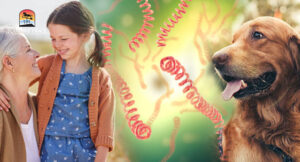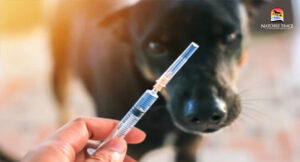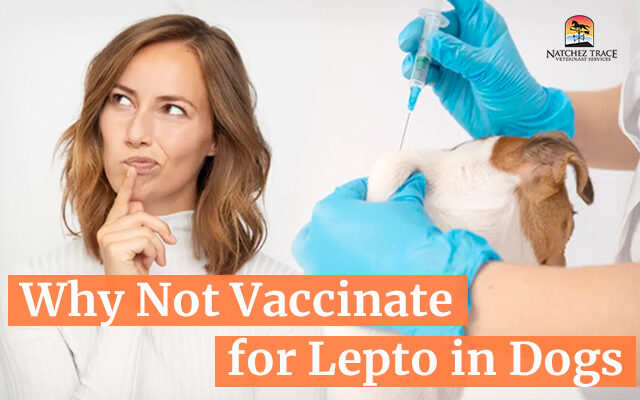While it is true that leptospirosis could kill your dog, this disease is quite rare in the United States. Therefore, there may be cases where you don’t have to give your dogs the leptospirosis vaccine.
What Is Lepto?
 Lepto, short for leptospirosis, is a bacterial infection caused by leptospira. This is a zoonotic disease, meaning it can transfer from animals to people. Even though zoonotic illnesses are uncommon, exposure to them increases your risk.
Lepto, short for leptospirosis, is a bacterial infection caused by leptospira. This is a zoonotic disease, meaning it can transfer from animals to people. Even though zoonotic illnesses are uncommon, exposure to them increases your risk.
Contact with infected bodily fluids is the main means of transmission.
This disease can affect dogs of any age, breed, or sex. Thus, veterinarians don’t rule out a diagnosis based on behavior or way of life. For example, large-breed dogs, male dogs, or dogs that spend most of their time outside are not the only canines that can contract canine leptospirosis.
Leptospira bacteria can be found in contaminated water. Dogs usually become infected after drinking, swimming, or simply walking through water.
Is the Leptospirosis Vaccine a Core Vaccine?
Core vaccines are shots the American Veterinary Medical Association (AVMA) recommends every pet owner consider.
 According to AVMA, leptospirosis is not rampant enough to be administered to every single animal. Consequently, lepto is not a core vaccine.
According to AVMA, leptospirosis is not rampant enough to be administered to every single animal. Consequently, lepto is not a core vaccine.
Leptospirosis vaccines are not highly recommended unless there is ample need for your dear pooch to get the shots. Meaning, there is a considerable chance your dog may be exposed to the bacteria.
2024 Update
As of 2024, the American Animal Hospital Association (AAHA) now classifies leptospirosis as a core vaccine recommended for all dogs, regardless of lifestyle. However, we still do not recommend it for all dogs. Learn why here.
What Are the Side Effects of the Leptospirosis Vaccine in Dogs?
The leptospirosis vaccine for dogs can result in side effects! Depending on your dog’s immune system and its health pre-injection, side effects can range from severe to minor to almost non-existent.

Here’s a list of allergic reactions you need to watch out for if you choose to give your pup leptospirosis vaccines:
- Lethargy
- Vomiting
- Diarrhea
- Swollen face
- Abnormally puffy eyes
- Swelling in the injection area
- Bumps all over the body (hives)
- Difficulty breathing
- Collapse
Depending on the severity of the allergic reaction, the leptospirosis vaccine may cause lasting harm to your pet. To prevent lasting harm, it’s important to address any reactions promptly with your vet.
When Is the Leptospirosis Vaccine Unnecessary?
Leptospirosis vaccines frequently come with side effects. In addition to vomiting and diarrhea, common responses include anaphylaxis, which can result in shock or death, and significant immune-mediated illnesses, which can show up as bleeding problems.
Additionally, the leptospirosis vaccine does not ensure your dog won’t develop the illness. For this reason, before deciding to vaccinate your dog, you must balance the danger of exposure to the disease in your location against the chance of a negative vaccination reaction.
 You must evaluate the advantages and disadvantages of each vaccine before making a choice. Before giving your dog any vaccine, carefully weigh ALL risks.
You must evaluate the advantages and disadvantages of each vaccine before making a choice. Before giving your dog any vaccine, carefully weigh ALL risks.
Although leptospirosis is a dangerous illness, it’s crucial to maintain your composure!
The leptospirosis vaccine is not necessary when the danger outweighs the benefit. Your veterinarian can help you determine whether leptospirosis is a problem in your area. In the interim, promote a healthy lifestyle for your dog to support a robust immune system.
If your dog exhibits any sickness symptoms, have your vet examine him.
If you want to get a Leptospirosis vaccine or discuss your dog’s risk factors with Dr. Smith, set up an appointment today!
People Also Ask
1. What is leptospirosis, and how does it affect dogs?
Leptospirosis is a bacterial infection caused by various strains of the Leptospira bacteria. Dogs can contract it through contact with contaminated water, soil, or urine of infected animals. The disease affects multiple organs and can lead to severe symptoms such as fever, vomiting, diarrhea, jaundice, and potentially fatal kidney or liver damage.
Dr. Smith’s Perspective
The main problem with Leptospirosis is the testing used to diagnose it. Sure, any vet can send a test off to be analyzed. The problem is the tests aren’t accurate. PCR testing has variable sensitivity, ranging from 21% to 69% depending on the timing and sample type. MAT testing is often inconclusive due to cross-reactivity and timing issues. Without quality testing, Leptospirosis is practically impossible to diagnose. In fact, I haven’t seen one case confirmed in 27 years. The testing methods aren’t accurate enough, and it’s virtually impossible to diagnose definitively. The other issue is that there are over 250 different leptospira serovars. The vaccine only covers four of those. What does this mean? It means a vaccinated dog is not fully protected and can still get leptospirosis.
2. Is the leptospirosis vaccine necessary for my dog?
The necessity of the leptospirosis vaccine depends on various factors, including geographic location, exposure to wildlife or areas with standing water, and lifestyle. Veterinarians often recommend the vaccine for dogs with potential exposure to the bacteria, such as those in rural or endemic regions. Still, it might be considered optional for some pets in urban settings with lower risk factors.
Dr. Smith’s Perspective
I never recommend the leptospirosis vaccine in my clinic. I only give it if the client requests it. The last time I gave a leptospirosis vaccine in my clinic, the dog had a reaction causing separation at the pad hairline junction of all four feet. My colleague, Dr. Damron, also experienced allergic reactions causing edematous extremities when giving the vaccine in his clinic.
3. What are the side effects of the leptospirosis vaccine?
Side effects of the leptospirosis vaccine can include mild reactions at the injection site, such as soreness or swelling. In rare cases, dogs may experience allergic reactions or more severe responses. However, adverse effects are generally uncommon and outweighed by the benefits of vaccination.
Dr. Smith’s Perspective
In my clinic, the side effects were primarily dermatologic problems. For example, urticaria, swelling, wheels, and flares. Twenty years ago, these reactions were prevalent, especially in dachshunds. The newer vaccines are somewhat safer.
4. How often does my dog need to be vaccinated against leptospirosis?
The vaccination schedule can vary based on the vaccine used and individual circumstances. Typically, an initial series of two vaccines, given 2-4 weeks apart, is administered, followed by annual boosters. Your veterinarian will determine the best schedule based on your dog’s risk factors and health status.
Dr. Smith’s Perspective
I don’t recommend vaccinating for Leptospirosis. If you choose to, just follow the standard recommended protocol.
5. Does the leptospirosis vaccine provide complete protection against the disease?
The vaccine protects against the most common Leptospira serovars included in the vaccine. However, no vaccine offers 100% protection against all strains. Still, vaccination significantly reduces the severity of the disease if a vaccinated dog is exposed to the bacteria.
Dr. Smith’s Perspective
No, the vaccine does not provide complete protection. The reason is there are so many different leptospirosis serovars. The vaccine only protects against four of the serovars.
6. Are there any specific dogs or breeds more susceptible to leptospirosis, and should they receive the vaccine?
While all dogs can potentially contract leptospirosis, those frequently exposed to outdoor environments, wildlife, or bodies of water are at higher risk. Some breeds, like hunting or sporting dogs, might have increased exposure due to their activities. Veterinarians may recommend vaccination based on individual risk factors rather than specific breeds.
Dr. Smith’s Perspective
I think it’s actually primarily a livestock disease, but it can be passed around via rodents. The most common sources of infection for dogs are direct contact with the infected urine of infected animals or indirect contact with water or moist soil contaminated with infected urine. You can learn more in this article.







